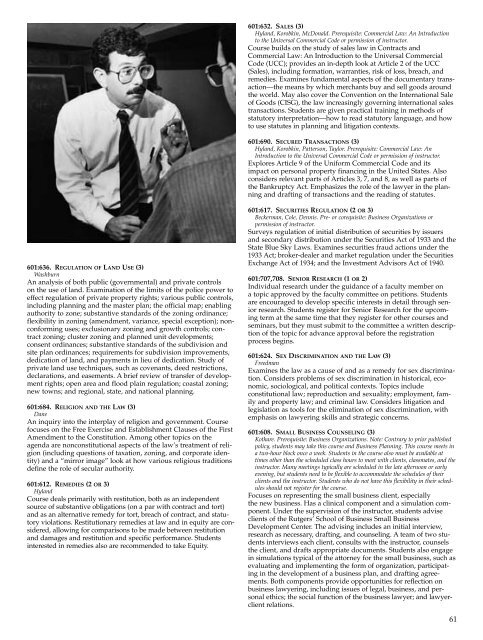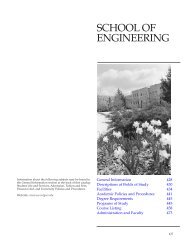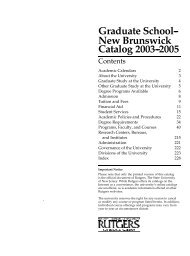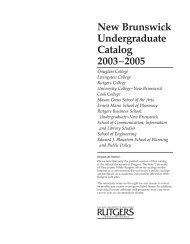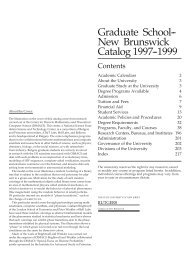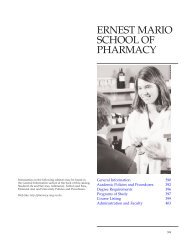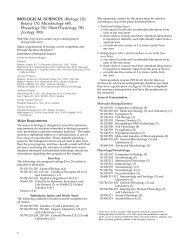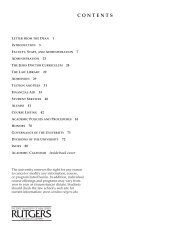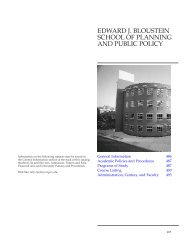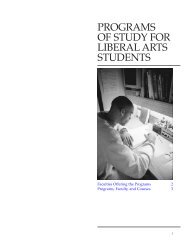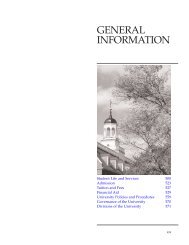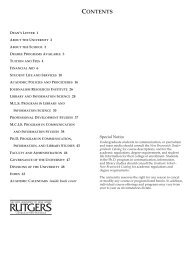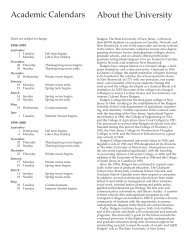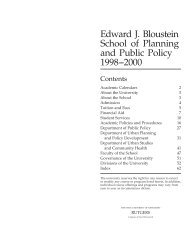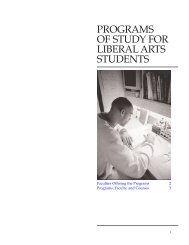Rutgers University School of Law-Camden - Catalogs - Rutgers, The ...
Rutgers University School of Law-Camden - Catalogs - Rutgers, The ...
Rutgers University School of Law-Camden - Catalogs - Rutgers, The ...
You also want an ePaper? Increase the reach of your titles
YUMPU automatically turns print PDFs into web optimized ePapers that Google loves.
601:632. SALES (3)<br />
Hyland, Korobkin, McDonald. Prerequisite: Commercial <strong>Law</strong>: An Introduction<br />
to the Universal Commercial Code or permission <strong>of</strong> instructor.<br />
Course builds on the study <strong>of</strong> sales law in Contracts and<br />
Commercial <strong>Law</strong>: An Introduction to the Universal Commercial<br />
Code (UCC); provides an in-depth look at Article 2 <strong>of</strong> the UCC<br />
(Sales), including formation, warranties, risk <strong>of</strong> loss, breach, and<br />
remedies. Examines fundamental aspects <strong>of</strong> the documentary transaction—the<br />
means by which merchants buy and sell goods around<br />
the world. May also cover the Convention on the International Sale<br />
<strong>of</strong> Goods (CISG), the law increasingly governing international sales<br />
transactions. Students are given practical training in methods <strong>of</strong><br />
statutory interpretation—how to read statutory language, and how<br />
to use statutes in planning and litigation contexts.<br />
601:690. SECURED TRANSACTIONS (3)<br />
Hyland, Korobkin, Patterson, Taylor. Prerequisite: Commercial <strong>Law</strong>: An<br />
Introduction to the Universal Commercial Code or permission <strong>of</strong> instructor.<br />
Explores Article 9 <strong>of</strong> the Uniform Commercial Code and its<br />
impact on personal property financing in the United States. Also<br />
considers relevant parts <strong>of</strong> Articles 3, 7, and 8, as well as parts <strong>of</strong><br />
the Bankruptcy Act. Emphasizes the role <strong>of</strong> the lawyer in the planning<br />
and drafting <strong>of</strong> transactions and the reading <strong>of</strong> statutes.<br />
601:636. REGULATION OF LAND USE (3)<br />
Washburn<br />
An analysis <strong>of</strong> both public (governmental) and private controls<br />
on the use <strong>of</strong> land. Examination <strong>of</strong> the limits <strong>of</strong> the police power to<br />
effect regulation <strong>of</strong> private property rights; various public controls,<br />
including planning and the master plan; the <strong>of</strong>ficial map; enabling<br />
authority to zone; substantive standards <strong>of</strong> the zoning ordinance;<br />
flexibility in zoning (amendment, variance, special exception); nonconforming<br />
uses; exclusionary zoning and growth controls; contract<br />
zoning; cluster zoning and planned unit developments;<br />
consent ordinances; substantive standards <strong>of</strong> the subdivision and<br />
site plan ordinances; requirements for subdivision improvements,<br />
dedication <strong>of</strong> land, and payments in lieu <strong>of</strong> dedication. Study <strong>of</strong><br />
private land use techniques, such as covenants, deed restrictions,<br />
declarations, and easements. A brief review <strong>of</strong> transfer <strong>of</strong> development<br />
rights; open area and flood plain regulation; coastal zoning;<br />
new towns; and regional, state, and national planning.<br />
601:684. RELIGION AND THE LAW (3)<br />
Dane<br />
An inquiry into the interplay <strong>of</strong> religion and government. Course<br />
focuses on the Free Exercise and Establishment Clauses <strong>of</strong> the First<br />
Amendment to the Constitution. Among other topics on the<br />
agenda are nonconstitutional aspects <strong>of</strong> the law’s treatment <strong>of</strong> religion<br />
(including questions <strong>of</strong> taxation, zoning, and corporate identity)<br />
and a “mirror image” look at how various religious traditions<br />
define the role <strong>of</strong> secular authority.<br />
601:612. REMEDIES (2 OR 3)<br />
Hyland<br />
Course deals primarily with restitution, both as an independent<br />
source <strong>of</strong> substantive obligations (on a par with contract and tort)<br />
and as an alternative remedy for tort, breach <strong>of</strong> contract, and statutory<br />
violations. Restitutionary remedies at law and in equity are considered,<br />
allowing for comparisons to be made between restitution<br />
and damages and restitution and specific performance. Students<br />
interested in remedies also are recommended to take Equity.<br />
601:617. SECURITIES REGULATION (2 OR 3)<br />
Beckerman, Cole, Dennis. Pre- or corequisite: Business Organizations or<br />
permission <strong>of</strong> instructor.<br />
Surveys regulation <strong>of</strong> initial distribution <strong>of</strong> securities by issuers<br />
and secondary distribution under the Securities Act <strong>of</strong> 1933 and the<br />
State Blue Sky <strong>Law</strong>s. Examines securities fraud actions under the<br />
1933 Act; broker-dealer and market regulation under the Securities<br />
Exchange Act <strong>of</strong> 1934; and the Investment Advisors Act <strong>of</strong> 1940.<br />
601:707,708. SENIOR RESEARCH (1 OR 2)<br />
Individual research under the guidance <strong>of</strong> a faculty member on<br />
a topic approved by the faculty committee on petitions. Students<br />
are encouraged to develop specific interests in detail through senior<br />
research. Students register for Senior Research for the upcoming<br />
term at the same time that they register for other courses and<br />
seminars, but they must submit to the committee a written description<br />
<strong>of</strong> the topic for advance approval before the registration<br />
process begins.<br />
601:624. SEX DISCRIMINATION AND THE LAW (3)<br />
Freedman<br />
Examines the law as a cause <strong>of</strong> and as a remedy for sex discrimination.<br />
Considers problems <strong>of</strong> sex discrimination in historical, economic,<br />
sociological, and political contexts. Topics include<br />
constitutional law; reproduction and sexuality; employment, family<br />
and property law; and criminal law. Considers litigation and<br />
legislation as tools for the elimination <strong>of</strong> sex discrimination, with<br />
emphasis on lawyering skills and strategic concerns.<br />
601:608. SMALL BUSINESS COUNSELING (3)<br />
Kothare. Prerequisite: Business Organizations. Note: Contrary to prior published<br />
policy, students may take this course and Business Planning. This course meets in<br />
a two-hour block once a week. Students in the course also must be available at<br />
times other than the scheduled class hours to meet with clients, classmates, and the<br />
instructor. Many meetings typically are scheduled in the late afternoon or early<br />
evening, but students need to be flexible to accommodate the schedules <strong>of</strong> their<br />
clients and the instructor. Students who do not have this flexibility in their schedules<br />
should not register for the course.<br />
Focuses on representing the small business client, especially<br />
the new business. Has a clinical component and a simulation component.<br />
Under the supervision <strong>of</strong> the instructor, students advise<br />
clients <strong>of</strong> the <strong>Rutgers</strong>’ <strong>School</strong> <strong>of</strong> Business Small Business<br />
Development Center. <strong>The</strong> advising includes an initial interview,<br />
research as necessary, drafting, and counseling. A team <strong>of</strong> two students<br />
interviews each client, consults with the instructor, counsels<br />
the client, and drafts appropriate documents. Students also engage<br />
in simulations typical <strong>of</strong> the attorney for the small business, such as<br />
evaluating and implementing the form <strong>of</strong> organization, participating<br />
in the development <strong>of</strong> a business plan, and drafting agreements.<br />
Both components provide opportunities for reflection on<br />
business lawyering, including issues <strong>of</strong> legal, business, and personal<br />
ethics; the social function <strong>of</strong> the business lawyer; and lawyerclient<br />
relations.<br />
61


